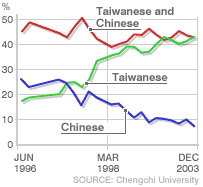This morning’s key headlines from GenerationalDynamics.com
- New Taiwan poll shows overwhelming support for independence from China
- China close to imposing an air defense ID zone (ADIZ) in South China Sea
New Taiwan poll shows overwhelming support for independence from China

From 2005: Taiwan poll results to question: ‘Do you feel Taiwanese, Chinese or both?’ (WSJ)
A new poll in Taiwan shows that an overwhelming majority of Taiwanese people reject eventual unification with China. This comes a week after Tsai Ing-wen, the leader of the Taiwan’s pro-independence Democratic Progressive Party (DPP), took office as president of Taiwan, having won an overwhelming and decisive electoral victory in January. ( “17-Jan-16 World View — Taiwan’s pro-independence party wins historic presidential election”)
According to the new poll, 66.4% oppose unification and only 18.5% are in favor, while 15.1% remain noncommittal. The poll found that people in younger generations were more likely to favor Taiwan independence. In the 20-29 age group, 72% supported independence.
This is consistent with a trend I’ve reported on in the past. The graph at the beginning of this article comes from 2005, and it shows that the portion of Taiwan’s population describing themselves as “Taiwanese,” as opposed to “Chinese,” had risen from 18% to 42% over the previous ten years. If we assume that being “Taiwanese” corresponds to favoring Taiwan independence, then that amount has risen from 42% to 66.4% in the 11 years since then.
This almost certainly means that the trend is highly generational. Older generations, especially those with some memory of the 1949 flight from Mao Zedong’s army to Hong Kong and then to Formosa, have clung to the hope that one day Taiwan and Beijing would reunite into a single China governed by Taiwan’s Nationalist government. People in younger generations understand that this scenario is not even remotely possible, and that reunification would mean being governed by the Chinese Communist Party (CCP) in Beijing, the same CCP that massacred thousands of college students in Tiananmen Square in 1989, and who have become increasingly authoritarian in Hong Kong, breaking their explicit public promise, when Britain returned Hong Kong to China in 1997, that they could have fully free and fair elections.
If I could figure all this out, then it’s certain that the officials in the CCP have also figured it out. Just last week, just after Tsai Ing-wen took office as president, Chinese media demanded that Tsai explicitly affirm that Taiwan is part of China, something that Tsai is refusing to do.
In 2005, during the time when Taiwan’s pro-independence Democratic Progressive Party was last in power, Beijing enacted an Anti-Secession law that required Beijing to invade Taiwan militarily if Taiwan took any steps to move towards independence, or even encourage independence in political speech. China is becoming increasingly nationalistic, and increasingly less willing to tolerate Taiwan’s independent streak. The new poll shows that time is not on Beijing’s side, and at some point, possibly soon, the military invasion of Taiwan will take place. Taipei Times
China close to imposing an air defense ID zone (ADIZ) in South China Sea
The Hong Kong based South China Morning Post is quoting China’s military sources as saying that China is close to announcing an air defense identification zone (ADIZ) in South China Sea, “pending US moves.”
An official is quoted as saying:
If the US military keeps making provocative moves to challenge China’s sovereignty in the region, it will give Beijing a good opportunity to declare an ADIZ in the South China Sea.
The “provocative moves” are an allusion to the US Navy’s completely non-threatening freedom of navigation patrols, in which US patrol vessels simply sail through the South China Sea. China has announced that it is annexing the entire South China Sea, including regions that have historically belonged to other countries, much as Adolf Hitler annexed portions of eastern Europe in 1939, and is demanding that any American patrol vessel request permission from China before entering the South China Sea. However, Secretary of Defense Ash Carter has repeatedly said that “The United States will fly, sail, and operate wherever international law allows, as we do all around the world.”
The announcement of an ADIZ would substantially escalate the tensions in the region. China has already been aggressively militarizing the South China Sea in preparation for the ADIZ. This includes creation of seven artificial islands and turning them into military naval and air force bases.
Just as China is preparing for war with Taiwan, China is also preparing for war in the South China Sea. The increasingly nationalistic Chinese people will not wait much longer before demanding that their leaders attack. South China Morning Post and India Times and The Diplomat
KEYS: Generational Dynamics, China, Taiwan, Tsai Ing-wen, DPP, Democratic Progressive Party, Anti-Secession Law, Hong Kong, South China Sea, Air Defense Identification Zone, ADIZ
Permanent web link to this article
Receive daily World View columns by e-mail

COMMENTS
Please let us know if you're having issues with commenting.